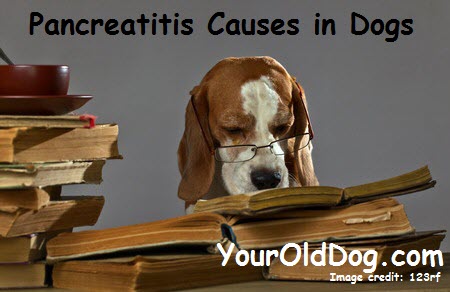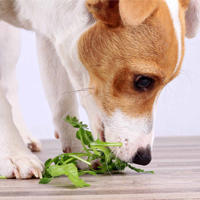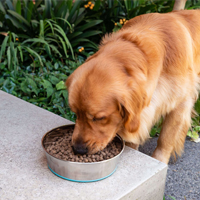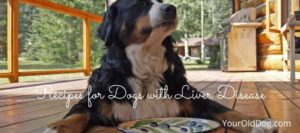
Canine Pancreatitis: Helpful Advice for Diet and Supplements
There are sadly many afflictions that can strike our four-legged friends.
Having experienced Pancreatitis in one of my own dogs, I can tell you that this is one of the worst conditions that our beloved pets can experience.
The nature of the condition makes it extremely painful, unpredictable and unfortunately, reoccurring.
This illness is one that never allows you to take your guard down.
What is Pancreatitis?
Canine pancreatitis is simply the inflammation of the pancreas. But, there are two different forms that dogs (and humans) can develop: acute pancreatitis and chronic pancreatitis.
Acute pancreatitis is essentially the sudden inflammation of the pancreas. This has some serious complications and can be a deadly condition, and should be considered a medical emergency. I know first hand, because it was the acute form that ultimately ended my Jenna’s life.
Chronic pancreatitis, on the other hand, is a more enduring version of pancreatic inflammation. This can actually strike in episodic fashion or can be quite persistent. While it’s still just as troubling, it’s not as serious as the “acute” form.
What Signs Should You Look For?
The pancreas is an abdominal gland that produces digestion-aiding enzymes, so the majority of the symptoms associated with pancreatitis in dogs are related to the digestive system.
The symptoms tend to occur suddenly in our pets, which can make treatment an even more urgent affair. Here’s what to look for:
- Lack of appetite
- Vomiting (large amounts) and diarrhea, possibly containing blood (diarrhea is not always present)
- Greater need to consume water
- Weakness
- Difficulty walking
- Abdominal tenderness
- Temperature fluctuations
- Sunken eyes
- Dry eyes and other signs of dehydration
- Lethargic, laying around
The above symptoms can lead to other diagnoses, of course, so it’s always best to talk with your holistic veterinarian as soon as possible to find out exactly what’s going on with your fur baby.

What Causes Pancreatitis?
First, it’s important to realize that there are no known specific causes of pancreatitis. The exact rationale behind this condition is unknown, which can make tracking it down a bit of a complicated issue. That’s not to say that there aren’t any contributing factors, however.
High blood fat content, also known as hyperlipemia, can lead to pancreatitis. This is a condition in which the amount of fat in the blood is heightened, generally after a meal. For the most part, this condition self-regulates with the consumption of food. But in some cases, dogs can have metabolic issues (like Jenna did) that lead to more fat than usual remaining in the blood.
My girl Jenna had Hypothyroidism which can lead to pancreatic problems. If your dog has a thyroid issue, or you suspect, I urge you to get your dog checked by a holistic vet. But, it is VITAL that you go to a veterinarian who can ACCURATELY read the thyroid test results. All vets cannot! They might tell you they can, but they can’t. It was Jenna’s holistic vet who discovered that she had thyroid issues, and Jenna had been seen my a traditional vet many times, with multiple blood tests.
Infectious diseases, like bacterial or viral infections, can also lead to pancreatitis. And abdominal trauma has also been known to lead to pancreatitis. Fast eating, stool eating, grass eating and stress are also contributing factors. Obesity also plays a role, as you might imagine, so the overall nutritional status certainly can lead to trouble over the long haul. Chronic episodes of can also lead to diabetes in dogs.
How is Pancreatitis Treated?
There are a number of treatment options for dogs who have endured pancreatic problems and many therapeutic measures that you as a dog owner can incorporate into his or her daily needs.
However, this isn’t to say that your dog shouldn’t be seen by a vet; it’s critical that you seek veterinary care. What I share with you here, is all about nutrition and digestion, since controlling Pancreatitis relies heavily on what your dog eats as well as necessary supplements.
If your dog is or has had an acute episode (the really bad Pancreatitis), your vet will most likely recommend IV fluids in order to keep the dog dehydrated and provide essential nutrients. Depending on the severity, dogs can end up being on IV for up to 5 days. It used to be believed that once the dog was off IV and sent home, the owner would have to watch closely of the next several days and this included withholding food and water (only giving ice cubes to stay hydrated) and supplements as well.
BUT, evidence seems to be growing among both people and pets, that heal time and survival rates are higher when the dog is fed sooner during recovery vs later. It is now generally agreed upon that withholding food and water for longer than 48 hours (which includes the amount of time the dog was without food or water before treatment) may cause leaky gut, cell atrophy of the small intestine and poisoning of the blood. The poisoning of the blood can lead to major organs failing and a decrease in survival.
TALK TO A HOLISTIC VET ABOUT YOUR CONCERNS OF WITHHOLDING FOOD FOR TOO LONG!
How and What to Feed Your Dog After He or She Recovers to Help Avoid Future Episodes
- Then, slowly introduce food at minimal amounts to see how your dog does. You should also feed in smaller portions through-out the day. This is VERY IMPORTANT!
- Again, diet is critical for this condition and it MUST be low fat (not kibble). If interested, my cookbook provides two easy crock pot recipes tailored specifically for Pancreatitis, or You can review it here if you like. *Note: The recipes in my cook book are home made, which means they are not balanced. For that reason, I note in the book that you should include a multivitamin daily. However, for dog’s with problems related to the pancreas, I suggest that you follow the protocol below instead and avoid the multi-vitamin. I also recommend Verve formula made by The Honest Kitchen.
- Diets MUST BE low fat and include the right dose of nourishment and essential elements. Digestive enzymes are critical for dogs susceptible to Pancreatitis. Although I used a standard digestive enzyme product for Jenna; I would have used this one made by Standard Process specifically for dogs with pancreatic problems if I had known about it. They have excellent products!
- Dogs who go through one pancreatic episode may be able to eat a normal diet again. However, dogs suffering with continued episodes including large smelly, greasy stools, must be fed a LOW FAT DIET indefinitely.
- A good B-Complex is also highly recommended. This one by Thorne Research should be good. I’ve used their products many times over the years, but I have to admit that I’ve never used this on my pets. Follow the instructions on the bottle based on your dog’s size.
- Weight reduction should also be a consideration, which could mean that other dietary concerns need to be addressed. And as always, consult your holistic veterinarian for more information about diets and other treatment options for your pet.
- Fish oil is good for fighting inflammation and aiding digestive problems, however, DO NOT FEED JUNK FISH OIL. The oil you include should be guaranteed mercury and toxin free. I’ve personally used products made my New Chapter and I highly recommend them for both you and your pet.

Snuggles Recovers
Recently, one of my readers shared a comment about his own dog “Snuggles” who went through an episode of Pancreatitis. Rich shared her diet along with her supplements, which I am sharing here:
~Rich 2-15-15
“Just to let u know and maybe it might help someone else, my old girl’s diet includes one boneless chicken breast shredded and rinsed of fat.
One tbsp of Greek plain yogurt, plain pumpkin puree, Chamomile tea which helps with yeast, bacteria and stress (learn more about the benefits of chamomile for dogs here, one tsp of powdered vitamins which have no wheat gluten, soy, msg, bran, corn, and no yeast.
1-1/2 cups plain white rice, which is easier to digest than brown. The product that has been the best is from the makers of Olewo. Snuggles gets one tbsp reconstituted beets and carrot (dehydrated). This has helped her allergies a great deal by reducing her itching, a super soft coat and less shedding.
You can learn more about Olewo here.
I love those last 2 products because they have made the biggest difference in the world, and fairly cheap too.
She is playing all the time, even at 3:00 in the morning by bringing her toys to me in bed while I am sleeping.
So, maybe some of that may help someone else out there. Plus, two times a day, she moves her bowels and her poop is picture perfect. I get so excited for her and she goes on time like clockwork 8 am and 8 pm! And, with the tea has also cut down on her gas and she is urinating less times and no night trips outside.
She seems to be holding it much better. So, I hope it helps.
Thank you!
Rich”
Reference: DogAware.com










